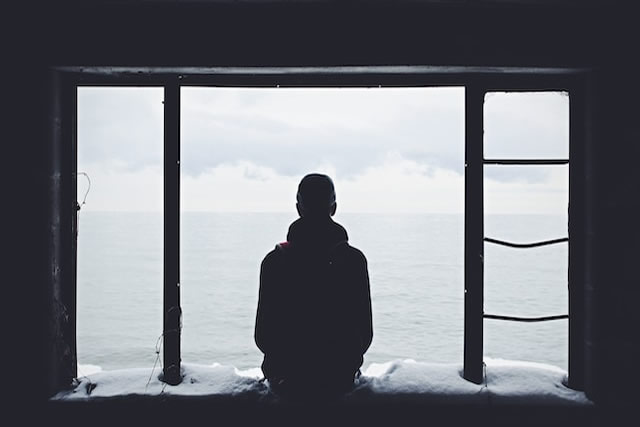It’s early morning on a dull, misty January day on the Cornish Coast in England. Sitting in a cold empty beach cafe, I feel a sense of loneliness creeping into my body. I catch my breath, the inhale rolling deep into my lungs simultaneously as the rhythmic sound of the Atlantic ocean fills my ears and the waves crash on the beach. Strangely as my inhale turns to exhale, the sun breaks through the monochrome sky sending an intense shimmering light across the vast open sea. As my exhale disperses into the radiant glow, the sense of aloneness transforms into one of connection, a feeling far more extensive than just me and my empty coffee cup, the beams of sunlight seeming to high-five me, gesturing that the sun has got my back.
Learning to come home or return to ourselves is an essential practice in Zen Buddhism. We become very dispersed in our daily lives, constantly pulled by our past experiences and pushed by our hopes for the future. Social media is no friend, as we have seen from the significant increases in mental health issues affecting young people. It connects us superficially to a world outside of reality and encourages us to grasp attention where little substance often exists behind the photos and videos we post and peruse.
In contrast, the present moment is a boundless river, a continuous stream in which most rarely swim. Instead, we find ourselves running after something, being carried away by the winds of our worldly desires, wanting something for ourselves until we eventually find ourselves lost in our suffering.
Leadership and loneliness seem to go hand in hand, or at least this is the feeling that many leaders and entrepreneurs carry with them. During a recent leadership programme I was teaching, I indeed came to appreciate the depth of suffering that this loneliness presents. I spoke to participants before the program’s start, and at least half of the group described their battle with loneliness at work and within their family homes. It is such a familiar feeling that it’s become an idiom for leaders: “It’s lonely at the top.” This idiom speaks the truth for many leaders, and research shows that these leaders aren’t alone in how they feel. A survey in the Harvard Business Review* found that half of the CEOs experience loneliness in their careers, 61 per cent of whom believe that this feeling hinders their performance.
We can all relate to returning home after a tough week in our demanding jobs. As we close the door and sink onto our familiar chair, something drops, expressing itself physically within us as a sinking feeling – I am back. For a brief moment, we are not caught in regret of the week gone or the anxiety of the week to follow.
In Zen, living alone enables us to reclaim our sovereignty. We find our freedom when we are not dragged away by the past or living in fear of the future. When we are wholly alone, we are present, whether surrounded by family, friends or colleagues or sitting desolate in a beach cafe. In my life, Friday evenings have shifted from the unhealthy consumption of grasping the wine bottle to drown out the week’s noise to one of self-nourishment. I found a way out by first stopping and recognizing my indulgent behaviour and its impact on my suffering. Instead, Friday evenings provided sustenance for the weekend and week ahead with a walk or sitting in the garden under the stars. Being out in nature, like meditation, can be challenging as it offers silence, allowing our internal noise and trauma in our bodies to manifest. Our negative experiences require transformation; once we see our suffering, we can show up and face it. By showing up for ourselves, we can truly show up for others, for which the impact on those we love and lead is immeasurable.
Once our cup is full, fears, anxieties, and sadness that may have once haunted us become a source of joy and energy for us and those around us. We no longer sit feeling the loneliness of the empty cafe, and with a single breathe, we can return to ourselves with the realisation that everything is here supporting us at that moment and connecting us in a meaningful way.
About the author: Andy Seizan Ryuji Robins is a certified instructor of Zen Leadership, an ordained Zen priest and a yoga instructor. Andy lives in the UK and has served the Institute for Zen Leadership as the UK/European Director and the Director of IZL in Asia.
This article has been kindly repurposed and you can read the original here
